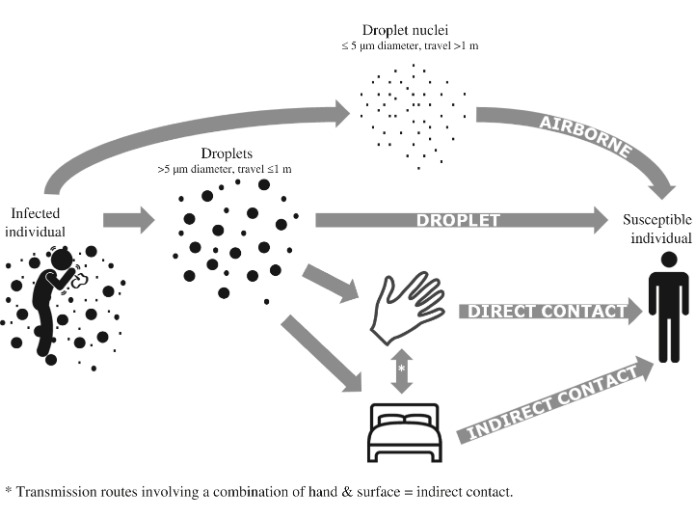Six months into a pandemic that has killed over half a million people across the world, more than 200 scientists from around the globe are challenging the official view of how Covid-19 spreads.
The World Health Organization (WHO) and the US Centre for Disease Control and Prevention currently focus on two types of transmission – the inhalation of droplets from an infected person or, less common, touching a contaminated surface and then transferring droplets to the eyes, nose or mouth.
However new research at the University of Queensland, Brisbane, Australia indicates growing evidence that a third pathway plays a significant role in infection. Microscopic particles known as aerosols can hang in the air for long periods and float dozens of feet, making poorly ventilated rooms, buses and other confined spaces high risk, even when people are socially distanced by two metres.
The university has written an open letter to the WHO indicating that 239 researchers from 32 countries are endorsing the fact that “aerosol transmission” is the explanation for several well documented “super-spreading” events in closed environments in China and the USA.
The proponents of aerosol transmission argue that effective masks worn correctly would help prevent the escape of exhaled aerosols as well as inhalation of the microscopic particles; but importantly the spread could also be reduced by improving ventilation and subjecting air circulating in ventilation systems to ultraviolet light.
At Rye Mutual Aid (RMA) we have followed the debate about the pros and cons of wearing face coverings closely and if the WHO accepts this latest research then it strengthens the case for using them, particularly in enclosed spaces.
Shielding the extremely vulnerable
During the lockdown some two million people with acute medical conditions, and who are considered extremely vulnerable to the virus, have been “shielded” in their homes. With the rate of infection falling, and as lockdown eases, as from Monday, July 6, the Secretary of State for Health and Social Care has announced that they should consider spending more time away from home provided that they take all necessary precautions – handwashing, social separation, and using face covering.
The government advice is that they can gather in groups of up to six people outdoors and form a “support bubble” with another household. Importantly the government shielding support package will remain in place until the end of July, but at that time people will no longer be advised to shield.
RMA understands that many vulnerable people remain anxious about the virus and what this means for them. Therefore, RMA services (and those of other organisations such as NHS Volunteers) will continue as long as local volunteers are prepared to help with:
- Going shopping for you to collect and deliver food and other essentials
- Picking up prescribed medicines
- Phoning for a ‘check-in and chat’ calls and
- Patient transport and NHS transport
It would be helpful for those who are vulnerable to indicate to RMA that community support will be required after the formal arrangements end. We know that newly vulnerable people are added to the lists every day, so the need for volunteer support could well remain.
A second wave?
Last week, we noted that England’s deputy chief medical officer said, as parts of Leicester went back in lockdown, that a second wave of coronavirus infections in the UK was “quite a possibility” and she remarked that Leicester was a “very good lesson” for the rest of the country.
Without ruling out further waves of the virus across the UK – or even a second peak of epidemic – she stressed that action would be taken to prevent localised flare-ups from becoming a wider problem. And, as we wrote last week, RMA is prepared for the long haul.
Image Credits: The Healthcare Infection Society / Elsevier https://www.journalofhospitalinfection.com/article/S0195-6701(15)00367-9/fulltext https://www.elsevier.com/legal/elsevier-website-terms-and-conditions.




The article, ‘Why masks are important’, does not explain all the pros and cons…
There’s protecting eyes, obtaining masks, removing them correctly, dispose of safely and being able to afford them – all worrying issues for the elderly and vulnerable.
Links to RMA are at: https://www.ryenews.org.uk/news/rye-mutual-aid-a-helping-hand
Another timely piece. Globally, the majority of the world manages to wear a mask to reduce transmission, including the elderly and those with sensory impairment. We in the UK have got used to seat belts, motorcycle helmets and drink-drive legislation over time. Hospital staff wear masks and more for 12 hrs solid. Perhaps we subliminally prefer lockdown to wearing a mask.
I am a member of the Rye Winchelsea Rotary club and before the pandemic was operating a new start-up company introducing to market a safety device for cyclists. When the call came to procure masks for the NHS we transferred our supply train to delivering masks from resources we have established in China. From this successful adaptation, we then saw the opportunity of integrating the now proven supply chain in providing masks for fellow Rotarians and have now established a website http://www.surgimasks.com where the general public can gain access to the supply of masks. A percentage of the sale price is then donated to the Rotary Club of Rye and Winchelsea to be distributed within the community where needed. Please consider the website knowing that in your purchase some of the proceeds will be returned to your community.
Thank you Rye news for your very informative mask editorial.
Regards.
Doug Rushbrooke.
CEO Surgimasks.com
Rye
TN31 7EL
doug@surgimasks.com
This is really worth a listen on the lesson from Japan.
https://www.lbc.co.uk/radio/presenters/james-obrien/japanese-caller-facemasks/
One of the biggest problems is till the droves and hordes of holiday makers sitting outside in pub gardens in a residential areas at Rye Harbour, where social distancing is out the window. No one is enforcing any distancing and it’s shoulder to shoulder as the paralytic juice starts to be consumed at noon and virtually no one is remotely interested in giving any space to or for the locals which includes the idiotic fast driving along the front where there is no pavement.